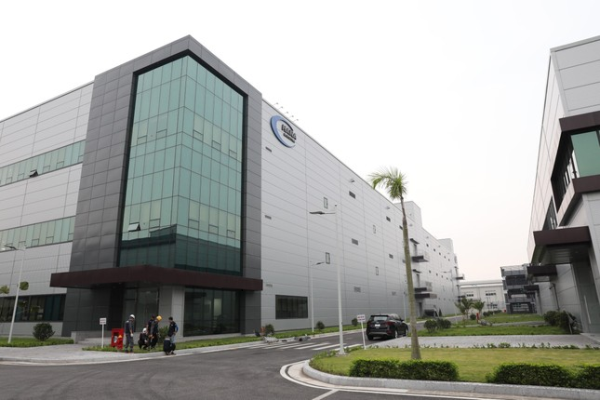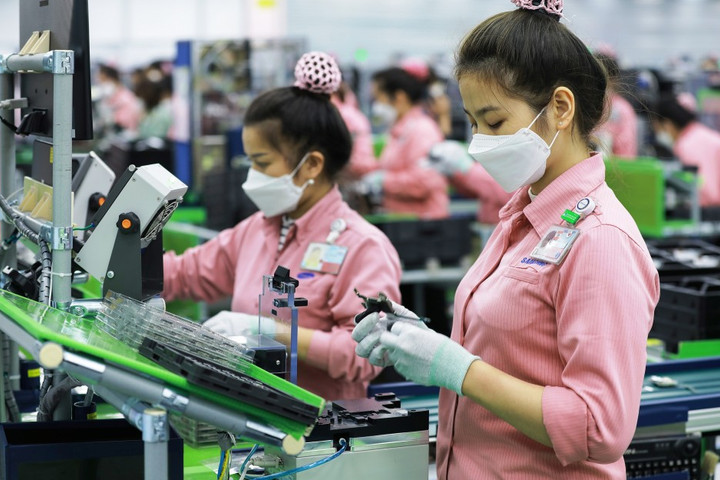
| Another semiconductor manufacturer expands in Vietnam |
|
10/17/2023 8:30:44 AM Vietnam continues to show its attraction in the field of semiconductor manufacturing with the latest investment of up to 1 billion USD from Hana Micron of Korea. Hana Micron, a Korean semiconductor company specializing in product assembly and packaging as well as module manufacturing and testing services, is the latest investor in Vietnam. The company plans to invest 1 billion USD in semiconductor production in Vietnam by 2025. Previously, this Korean company also inaugurated its first semiconductor factory last month in Bac Giang province. 
Hana Micron plans to invest 1 billion USD in semiconductor production in Vietnam by 2025. This new project was designed in Van Trung Industrial Park, Bac Giang province, and is the first project of its kind in Northern Vietnam. This is also the second factory of Hana Micron Vina, a subsidiary of the Korean corporation, in the Northern provinces. The first facility begins operations in 2022, producing integrated circuit boards for mobile phones and other smart electronic products. Mr. Choi Chang Ho, Chairman of Hana Micron, said Hana Micron Vina will be the group’s number one production facility in the world and Vietnamese human resources will account for 70% of the group’s total workforce. He also added that the group will increase investment in the province from the current 600 million USD to more than 1 billion USD by 2025, generating annual revenue of 800 million USD and creating 4,000 jobs for Vietnamese workers. >>> Semiconductor "war" (Part II): Exploding supply chain shift trend >>> Semiconductor "war" (Part III): Hundreds of billions of dollars "evaporated" because of tension The attraction of Vietnam It can be said that Vietnam is increasingly becoming an attractive destination for investors in the global semiconductor field. Many international experts also believe that Vietnam may become the world’s leading chip manufacturing center, especially when many large technology corporations have announced plans to boost semiconductor component production in the future. water. 
Vietnam is increasingly becoming an attractive destination for investors in the global semiconductor field. According to statistics, in the first 8 months of this year, phones and electronic components were recorded as Vietnam’s most prominent export turnover, reaching nearly 40 billion USD. Currently, Vietnam ranks 9th globally in electronics exports. Many leading companies have made extensive investment commitments. Intel, the American chip giant, is considering an additional investment worth $1.31 billion in Ho Chi Minh City High-Tech Park. This facility is Intel’s most important manufacturing facility, contributing to 70% of the company’s global output. This makes it unlikely that the company will expand its scale in Malaysia. Mr. Kim Huat Ooi, Vice President of Intel Products Vietnam Company, once said: "The three main factors for us to produce in Vietnam are a very stable socio-political environment, and the Government’s continuous expansion. free trade agreements and an abundant workforce.” In addition to Intel, many other famous electronic corporations such as Samsung, LG, and Apple all have factories and research and development (R&D) centers in Vietnam. Samsung recently announced plans to produce semiconductors from July next year with an additional investment of 920 million USD. It can be seen that, in the current global context, when the US has just issued the CHIP Act worth 52 billion USD to support the country’s chip manufacturing industry, countries in the supply chain like Vietnam can seize the opportunity. to participate and grow. According to experts, Vietnam is increasingly attracting interest from global semiconductor companies in the context of high political stability, along with an abundant human resource and especially easy access. access to Asian high-tech supply chains. What we need to do at the present time is to access cooperation agreements to support technology transfer, towards complete autonomy of essential stages in the semiconductor production process, to open up New page for Vietnam’s supporting technology industry. However, in addition to the encouraging signs from the billion-dollar investments of global companies in the semiconductor field, there are still some significant challenges. The shortage of skilled labor and infrastructure that does not meet the requirements of investors, along with the weak competitiveness of domestic supporting enterprises, are creating significant challenges for development. development of Vietnam’s semiconductor industry. |
| Diendandoanhnghiep.vn |